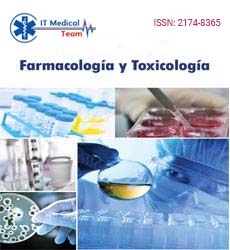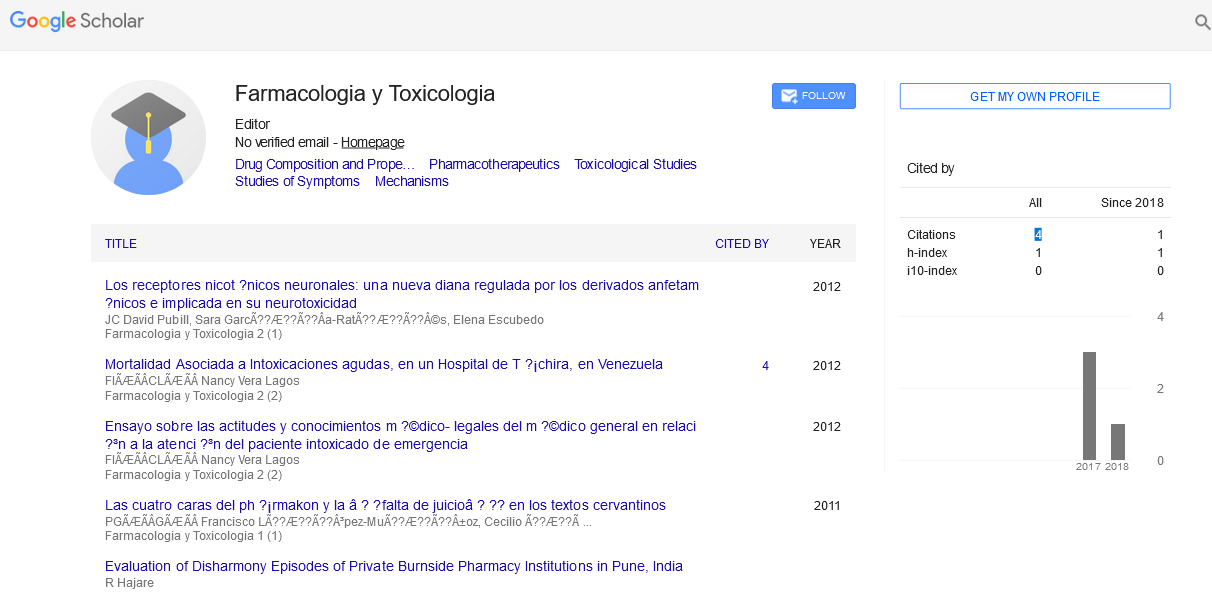Perspective - (2023) Volume 13, Issue 5
Therapeutic trials in toxicological research: Advancements, challenges and future prospects
Patrick Poulin*
Department of Toxicology, University of Ottaya, Toronto, Canada
*Correspondence:
Patrick Poulin, Department of Toxicology, University of Ottaya, Toronto,
Canada,
Email:
Received: 04-Sep-2023, Manuscript No. ipft-23-14223;
Editor assigned: 07-Sep-2023, Pre QC No. P-14223;
Reviewed: 21-Sep-2023, QC No. Q-14223;
Revised: 03-Oct-2023, Manuscript No. R-14223;
Published:
19-Oct-2023, DOI: -
Introduction
Toxicological research plays a pivotal role in
understanding the potential adverse effects of chemical
compounds on living organisms, including humans. This
knowledge is instrumental in guiding regulatory decisions,
risk assessments and public health protection. Therapeutic
trials within the realm of toxicological research are vital
for evaluating the efficacy of treatments designed to
mitigate the adverse effects of toxic substances. This
article delves into the significance of therapeutic trials in
toxicological research, discusses the latest advancements,
the challenges faced and outlines the future prospects of
this critical field.
Description
The significance of therapeutic trials in
toxicological research
Advancing public health: Therapeutic trials in
toxicological research hold immense significance in
safeguarding public health. They provide a means to assess
the effectiveness of potential treatments for toxic
exposures and help in the development of therapeutic
strategies. Toxic substances are pervasive in our
environment, from industrial chemicals to pollutants,
making the ability to counteract their harmful effects a
crucial aspect of public health protection.
Uncovering mechanisms of toxicity: Beyond the
immediate goal of finding treatments, therapeutic trials
often uncover important insights into the mechanisms of
toxicity. These findings not only aid in therapeutic
development but also contribute to a deeper
understanding of toxicology as a whole. By examining
how a treatment ameliorates the toxic effects, researchers
gain valuable insights into the biochemical, cellular and
physiological processes affected by toxic substances.
Advancements in therapeutic trials
Personalized medicine: One of the most promising
advancements in therapeutic trials in toxicological research
is the move towards personalized medicine. This approach
tailors treatments to an individual's genetic makeup,
allowing for more precise and effective interventions.
Personalized medicine has the potential to revolutionize
toxicological treatment, ensuring that patients receive the
most appropriate and effective therapy based on their unique genetic profiles.
Use of targeted therapies: Targeted therapies have gained
prominence in toxicological research, aiming to selectively
inhibit specific pathways or molecules involved in toxic
responses. This approach minimizes off-target effects and
enhances the therapeutic efficacy. For example, in cases of
chemical poisoning, researchers are developing treatments
that specifically target the toxins or their downstream
effects, providing a more focused and efficient solution.
Pharmacokinetics and pharmacodynamics studies: Advancements in Pharmacokinetics (PK) and
Pharmacodynamics (PD) studies have greatly improved
the understanding of how therapeutic agents interact with
toxic substances in the body. PK studies focus on how the
body absorbs, distributes, metabolizes and excretes drugs,
while PD studies examine the drug's effects on the body.
These studies aid in the optimization of dosing regimens,
leading to more effective therapies.
Emerging technologies: Cutting-edge technologies,
such as nanomedicine and gene editing, are being
harnessed for therapeutic trials in toxicological research.
Nanoparticles can deliver drugs with precision to affected
tissues, minimizing systemic side effects. Gene editing
techniques like CRISPR-Cas9 hold promise in correcting
genetic mutations that render individuals more susceptible
to toxic exposures.
Challenges in therapeutic trials
Ethical and regulatory challenges: Conducting therapeutic
trials in toxicological research poses numerous ethical and
regulatory challenges. Ensuring the safety and well-being
of study participants, obtaining informed consent and
adhering to ethical guidelines are paramount. Additionally,
regulatory approval processes can be lengthy and complex,
delaying the introduction of potentially life-saving
treatments.
Limited data on rare and emerging toxins: In cases
involving rare or newly discovered toxic substances, the
availability of data for therapeutic trials is limited. This
hampers the development of effective treatments, as
researchers may lack the necessary information on toxicity
mechanisms and potential countermeasures. Establishing
comprehensive databases for emerging toxins is crucial for
addressing this challenge.
Preclinical-to-clinical translation: Translating promising
preclinical findings into successful clinical treatments is a
significant challenge in therapeutic trials. Many
compounds that show efficacy in animal models may
not perform as expected in human trials due to species specific differences. Bridging this gap between
preclinical and clinical research remains a major hurdle.
Funding and resource constraints: Securing adequate
funding and resources for therapeutic trials is a perennial
challenge. The development and testing of therapies for
toxic exposures require substantial financial investments.
Overcoming this challenge often necessitates collaboration
between academic institutions, government agencies and
private sector organizations.
Future prospects in therapeutic trials
Advanced data analytics: The integration of advanced
data analytics, including artificial intelligence and
machine learning, holds great promise in toxicological
research. These technologies can analyze vast datasets to
identify potential therapeutic targets and predict
treatment outcomes, accelerating the development of
effective therapies.
Biomarker discovery: Advancements in biomarker
discovery are essential for personalized toxicological
treatments. Identifying specific biomarkers associated
with toxic exposures allows for early diagnosis and
targeted interventions. This area of research is likely to see
significant growth in the coming years.
Multidisciplinary collaboration: Collaboration across
diverse fields such as toxicology, pharmacology, genomics
and immunology will be pivotal in addressing the
challenges of therapeutic trials. Multidisciplinary teams
can provide a holistic approach to toxicological research,
facilitating the development of comprehensive and
effective treatments.
Conclusion
Therapeutic trials in toxicological research are
indispensable for advancing public health, understanding
mechanisms of toxicity and developing effective
treatments for toxic exposures. Recent advancements in
personalized medicine, targeted therapies and advanced
technologies are paving the way for more efficient
therapeutic trials. However, ethical and regulatory
challenges, limited data on emerging toxins and the
translational gap between preclinical and clinical research
remain significant obstacles. The future of therapeutic
trials in toxicological research holds promise with
advanced data analytics, biomarker discovery,
multidisciplinary collaboration and increased public
awareness. By addressing these challenges and capitalizing
on opportunities, researchers can continue to make
significant strides in this critical field, ultimately
benefiting public health and safety.





